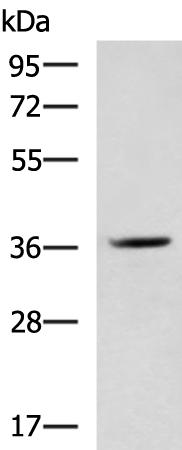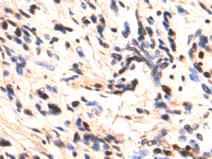

| WB | 咨询技术 | Human,Mouse,Rat |
| IF | 咨询技术 | Human,Mouse,Rat |
| IHC | 1/50-1/200 | Human,Mouse,Rat |
| ICC | 技术咨询 | Human,Mouse,Rat |
| FCM | 咨询技术 | Human,Mouse,Rat |
| Elisa | 咨询技术 | Human,Mouse,Rat |
| Aliases | PUM; MYF3; MYOD; bHLHc1 |
| Entrez GeneID | 4654; |
| WB Predicted band size | 35 kDaa |
| Host/Isotype | Rabbit IgG |
| Antibody Type | Primary antibody |
| Storage | Store at 4°C short term. Aliquot and store at -20°C long term. Avoid freeze/thaw cycles. |
| Species Reactivity | Human, Mouse, Rat |
| Immunogen | Synthetic peptide corresponding to residues near the C terminal of human myogenic differentiation 1 |
| Formulation | Purified antibody in PBS with 0.05% sodium azide. |
+ +
以下是关于MYOD1抗体的3篇参考文献,包含文献名称、作者及摘要概述:
---
1. **文献名称**:*MyoD1: a nuclear phosphoprotein requiring a Myc homology region to convert fibroblasts to myoblasts*
**作者**:Davis RL, Weintraub H, Lassar AB
**摘要**:该研究首次证实MYOD1作为成肌调节因子,能够通过其保守结构域诱导非肌细胞(如成纤维细胞)分化为肌细胞。研究利用MYOD1抗体验证其核定位及与DNA结合能力,揭示了其在肌肉分化中的核心调控作用。
2. **文献名称**:*MYOD1 as a specific marker for rhabdomyosarcoma diagnosis*
**作者**:Doyle LA, Tao D, Mariño-Enríquez A
**摘要**:本文探讨MYOD1抗体在横纹肌肉瘤(RMS)诊断中的应用,发现其在肺泡型RMS中特异性高表达,可作为区分其他小圆细胞肿瘤的生物标志物,强调了其在临床病理学中的价值。
3. **文献名称**:*The role of MYOD1 in skeletal muscle regeneration and satellite cell activation*
**作者**:Yin H, Price F, Rudnicki MA
**摘要**:研究通过MYOD1抗体检测发现,MYOD1在肌肉干细胞(卫星细胞)激活和损伤后再生过程中起关键作用,其表达缺失会导致肌细胞分化障碍,提示其在再生医学中的潜在应用。
---
以上文献涵盖MYOD1的基础功能、诊断价值及再生机制研究,均为该领域的代表性成果。如需具体DOI或发表年份,可进一步补充。
MYOD1 antibody is a widely used tool in molecular and cellular biology research, primarily targeting the MYOD1 protein—a key transcription factor involved in skeletal muscle development. MYOD1. also known as myogenic differentiation 1. belongs to the myogenic regulatory factor (MRF) family and plays a central role in initiating myogenesis by regulating the expression of muscle-specific genes. Structurally, it contains a basic helix-loop-helix (bHLH) domain that facilitates DNA binding and dimerization with other transcription factors.
Antibodies against MYOD1 are essential for detecting its expression in various experimental settings, including Western blotting, immunohistochemistry (IHC), and immunofluorescence (IF). These antibodies help researchers study muscle cell differentiation, regeneration, and lineage commitment in both normal and pathological contexts. In cancer research, MYOD1 antibodies are particularly valuable for diagnosing and characterizing rhabdomyosarcoma, a soft-tissue sarcoma with skeletal muscle differentiation, where MYOD1 serves as a specific biomarker.
Additionally, MYOD1 antibodies aid in distinguishing myogenic tumors from other small round blue cell tumors, enhancing diagnostic accuracy. Recent studies also explore MYOD1's potential in reprogramming non-muscle cells into myogenic lineages, underscoring its therapeutic relevance. When using MYOD1 antibodies, validation for specificity and cross-reactivity is critical, as homologous proteins in the MRF family (e.g., Myogenin, Myf5) may cause false positives. Overall, MYOD1 antibodies remain indispensable for advancing muscle biology and oncology research.
×